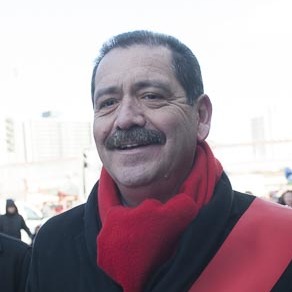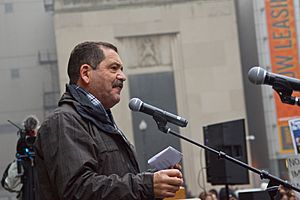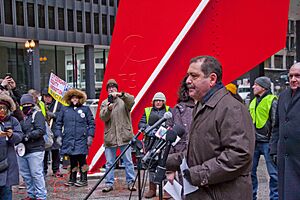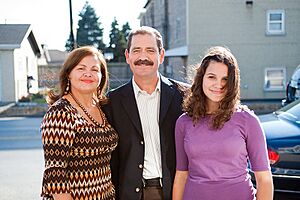Chuy García facts for kids
Quick facts for kids
Chuy García
|
|
|---|---|
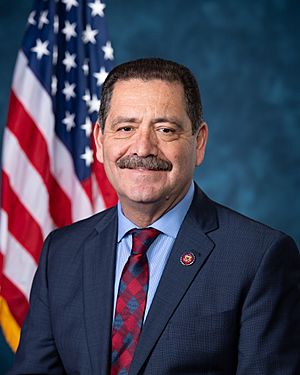
Official portrait, 2019
|
|
| Member of the U.S. House of Representatives from Illinois's 4th district |
|
| Assumed office January 3, 2019 |
|
| Preceded by | Luis Gutiérrez |
| Member of the Cook County Board of Commissioners from the 7th district |
|
| In office January 3, 2011 – November 30, 2018 |
|
| Preceded by | Joseph Mario Moreno |
| Succeeded by | Alma Anaya |
| Member of the Illinois Senate from the 1st district |
|
| In office January 13, 1993 – January 13, 1999 |
|
| Preceded by | Howard W. Carroll |
| Succeeded by | Antonio Munoz |
| Member of the Chicago City Council from the 22nd ward |
|
| In office March 25, 1986 – January 1, 1993 |
|
| Preceded by | Frank Stemberk |
| Succeeded by | Ricardo Muñoz |
| Personal details | |
| Born | April 12, 1956 Durango, Mexico |
| Political party | Democratic |
| Spouse |
Evelyn García
(m. 1980) |
| Children | 3 |
| Education | University of Illinois, Chicago (BA, MUP) |
| Signature | |
| Website | |
Jesús G. "Chuy" García, born on April 12, 1956, is an American politician. He represents Illinois's 4th district in the U.S. House of Representatives. He has been a member of the Democratic Party since 2019.
Before joining Congress, he served in several important roles. He was on the Cook County Board of Commissioners, in the Illinois Senate, and on the Chicago City Council. García also ran for mayor of Chicago in 2015 and 2023. Throughout his career, he has been known as a progressive leader.
García was first elected to the Chicago City Council in 1986. There, he was a strong supporter of Mayor Harold Washington. In 1992, he made history as the first Mexican-American member of the Illinois State Senate. He later lost his reelection bid for the state senate in 1998.
In 2010, García was elected to the 7th district of the Cook County Board of Commissioners. He became a floor leader after his election. In 2015, he ran for mayor of Chicago. He finished second in the first election round, leading to a runoff against the current mayor, Rahm Emanuel. Emanuel won that election. García then won a seat in the U.S. House of Representatives in 2018. He took over from Luis Gutiérrez, who was retiring.
He ran for mayor of Chicago again in 2023, challenging Mayor Lori Lightfoot. He placed fourth in the first round of voting. After that, García supported Brandon Johnson, who went on to win the runoff election.
Contents
Early Life and Education
García was born in Durango, Mexico. His father worked as a farm laborer through a U.S. government program called the bracero program.
In 1965, García moved to the U.S. and became a permanent resident. His family settled in the Little Village neighborhood of Chicago, Illinois. García still lives there today. He graduated from St. Rita High School in 1974. In 1977, García became a citizen of the United States.
From 1977 to 1980, García worked at the Legal Assistance Foundation. During this time, he earned a Bachelor of Arts degree in political science from the University of Illinois at Chicago. He then became assistant director of the Little Village Neighborhood Housing Service, working there until 1984. García also holds a master's degree in urban public planning and policy from the University of Illinois at Chicago.
Early Political Career
Chicago City Council Service
In 1983, García managed the campaign for labor organizer Rudy Lozano. Lozano ran against Frank Stemberk, the alderman for the 22nd Ward. Lozano lost by a very small number of votes. His supporters believed this was due to some voters being unfairly removed from the lists. Lozano was sadly murdered in June 1983.
In 1984, García decided to challenge Stemberk for a local party leadership role. Lozano's supporters rallied behind García, and Mayor Harold Washington also supported him. Stemberk was an ally of Alderman Edward Vrdolyak, who often disagreed with Mayor Washington. This disagreement was known as the "Council Wars" in Chicago. García defeated Stemberk in the election. Unlike other leaders, García used his office to help people in his community. Mayor Washington also appointed him Deputy Commissioner of the Department of Water from 1984 to 1986.
A federal court ruled that the city's ward map was unfair to Black and Hispanic voters. As a result, a special election was ordered for March 18, 1986, in seven wards, including the 22nd. This special election gave Mayor Washington a chance to gain more control in the city council. Stemberk chose not to run again, and García announced his candidacy. García won the election, carrying most of the voting areas. He was also reelected to his party leadership role.
García's election, along with two other supporters of Mayor Washington, changed the balance of power in the city council. Six weeks later, another Washington supporter won an election, making the council evenly split. Since Mayor Washington could break ties, the "Council Wars" ended. García was reelected to the city council in 1987 and 1991. On the council, he worked on various committees, including Finance and Education. He also led the Aviation committee.
Serving in the Illinois Senate
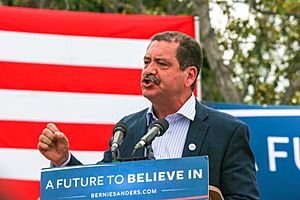
In 1992, García ran for the Illinois Senate in the 1st district. He won the Democratic primary election. This primary win was almost like winning the general election because the district strongly supported Democrats. In the general election, García easily defeated his Republican opponent. He became the first state senator in Illinois of Mexican descent. García then resigned from the city council, and his friend Ricardo Muñoz took his place.
In 1996, García faced a challenge in the Democratic primary from Alderman Juan Soliz. García defeated Soliz and was reelected without opposition in the general election. As a state senator, García helped pass laws that supported immigrants, especially in healthcare and education. In 1998, he lost the Democratic primary election to Antonio Munoz. Munoz was supported by a powerful political group.
Time Outside of Elected Office
After leaving the Illinois Senate in January 1999, García became the executive director of the Little Village Community Development Corporation. This organization, now known as Enlace, grew significantly under his leadership. In June 2005, he also helped start the Latino Action Research Network, a group focused on helping Latino communities.
In 2001, García and community members demanded that a promised high school be built. Fourteen parents and grandparents started a hunger strike to draw attention to the issue. The head of Chicago Public Schools, Paul Vallas, eventually met with them. The hunger strike lasted 19 days and put a lot of public pressure on the school district.
In August 2001, the new Chicago Public Schools CEO, Arne Duncan, approved funds to start building the school. Community members continued to be involved in designing the new school. They even conducted surveys to help decide what each school on the campus would focus on.
Cook County Board of Commissioners
In 2010, García ran for the Cook County Board of Commissioners. He challenged the current member for the 7th district, Joseph Mario Moreno, in the Democratic primary. García won this election. In the general election, he defeated the Green Party candidate. After the election, Toni Preckwinkle appointed García as the Floor Leader. He was reelected without opposition for a second term on the Board of Commissioners in 2014.
2015 Mayoral Campaign
García decided to run for mayor against the current mayor, Rahm Emanuel. He was encouraged by Karen Lewis, a progressive leader who had to stop her own campaign due to illness. In the February 24 primary election, García won 34% of the vote. Emanuel did not win more than 50%, which meant a runoff election was needed on April 7. This campaign gained national attention. Senator Bernie Sanders supported García, calling it a "political revolution in Chicago." García opposed certain city plans, like a rapid bus transit system and red light cameras. Emanuel won the runoff election with 55% of the vote.
After the Mayoral Election
García supported Bernie Sanders for President of the United States in both the 2016 and 2020 elections. In the 2016 general election, García was an elector from Illinois. He cast his vote for Democratic candidates Hillary Clinton and Tim Kaine.
After Mayor Rahm Emanuel announced he would not seek a third term in 2019, many wondered if a prominent Latino politician would run. Both Luis Gutiérrez and García were considered. Gutiérrez decided not to run and encouraged García to consider it. Senator Sanders also hoped García would "take a look for running for mayor." However, García ultimately did not run for mayor in 2019.
In the 2019 mayoral runoff election, García supported Lori Lightfoot. This was a significant boost for Lightfoot's campaign against Toni Preckwinkle. Preckwinkle had been García's ally on the Cook County Board, but she had not supported him for mayor in 2015. Lightfoot went on to win the election by a large margin.
U.S. House of Representatives
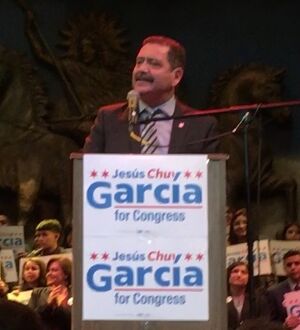
While in Congress, García has become an important figure in Illinois politics. He has been an ally of former Illinois House Speaker Michael Madigan.
Elections for Congress
2018 Election
On November 27, 2017, Congressman Luis Gutiérrez announced his retirement. The next day, García stated his intention to run for the open seat. Gutiérrez publicly endorsed García as his successor. Bernie Sanders also supported García. Because the district is strongly Democratic, the primary election is usually the most important contest.
García won the Democratic nomination in March 2018 with 60% of the primary votes. He then defeated his opponent in the November 6 general election with 86% of the vote.
2020 Election
García ran for reelection in 2020 and faced no opposition in the primary election. He won the general election with nearly 85% of the vote.
2022 Election
García was reelected for a third term in 2022. He defeated Republican nominee James Falakos and Working Class Party nominee Edward Hershey.
Time in Office
Immigration Policy
In July 2019, during a congressional hearing, García questioned a former official about the Trump administration family separation policy. He asked why such actions were allowed to happen.
On December 10, 2019, García introduced the New Way Forward Act. This bill aimed to make changes to immigration laws.
Foreign Policy Views
In July 2019, García voted against a House resolution that condemned a movement targeting Israel. The resolution passed with a large majority.
In 2021, García was one of eight Democrats who voted against funding for Israel's missile defense system, known as Iron Dome.
In 2023, García was among 56 Democrats who voted to direct President Joe Biden to remove U.S. troops from Syria within 180 days.
2024 Presidential Election
On July 19, 2024, García called for Joe Biden to withdraw from the 2024 United States presidential election.
Fiscal Responsibility Act of 2023
García was among the 46 Democrats who voted against the final passage of the Fiscal Responsibility Act of 2023 in the House of Representatives.
Committee Assignments
For the 119th Congress, Chuy García serves on these committees:
- Committee on the Judiciary
- Subcommittee on the Administrative State, Regulatory Reform, and Antitrust
- Subcommittee on Immigration Integrity, Security, and Enforcement
- Committee on Transportation and Infrastructure
- Subcommittee on Aviation
- Subcommittee on Highways and Transit
- Subcommittee on Railroads, Pipelines, and Hazardous Materials
Caucus Memberships
García is a member of several groups in Congress:
- Congressional Hispanic Caucus
- Congressional LGBT Equality Caucus
- Congressional Progressive Caucus
2023 Mayoral Campaign
In early 2022, García was considered a possible candidate to challenge Mayor Lori Lightfoot in the 2023 election. He had previously said that Lightfoot was facing a very tough reelection.
García announced his second campaign for mayor of Chicago on November 10, 2022. This date was the 40th anniversary of his mentor Harold Washington's announcement for his 1983 mayoral campaign. García's announcement came just two days after he was reelected to the U.S. House of Representatives. Mayor Lightfoot criticized García for "abandoning Congress" at a time when the Democratic Party was losing its majority in the House.
García was the last of Lightfoot's eight challengers to announce his campaign. By the time he announced, some groups that had supported him in 2015 had already pledged their support to Brandon Johnson. García asked these groups to wait, but they endorsed Johnson in September 2022 because he did not give them a date for his announcement.
García received endorsements from several notable figures. These included former Illinois Governor Pat Quinn and former Chicago mayor David Orr. Other supporters included U.S. Representatives Luis Gutiérrez, Jan Schakowsky, and Mike Quigley. Activist Dolores Huerta and the United Farm Workers also endorsed him.
García was the only Latino candidate in the election. He and Paul Vallas were the only two candidates who were not Black.
García faced some questions about political donations he received. Mayor Lightfoot used these issues in her campaign ads against him.
As Paul Vallas gained popularity in the polls, García joined Lightfoot in criticizing Vallas. They suggested Vallas was too aligned with the Republican Party. García also criticized Vallas's close relationship with the Chicago police union. García said that Vallas's closeness to the police union meant there would be "no police accountability" if Vallas became mayor.
García also had disagreements with Brandon Johnson. Johnson said García had "abandoned the progressive movement." He also said García had not been active enough on issues affecting Latino neighborhoods. García, in turn, questioned Johnson's tax proposals. He also wondered if Johnson, a former organizer for the Chicago Teachers Union, could fairly negotiate with them as mayor.
Despite being a strong candidate at one point, García was defeated in the first round of the election. He placed fourth out of nine candidates, receiving 77,222 votes. Vallas and Johnson placed first and second, moving on to the runoff election.
García won in only six of the city's 50 wards. All six of these wards were represented by Latino aldermen. In five of them, Vallas was the runner-up. One reason for García's lower performance was that voter turnout in Latino-majority wards was lower than in other parts of the city. On March 17, García endorsed Brandon Johnson for the runoff election.
Electoral History
Illinois State Senate
| Illinois 1st State Senate District General Election, 1992 | ||||
|---|---|---|---|---|
| Candidate | General election | |||
| Votes | % | |||
| Democratic Jesús G. Garcia | 21314 | 81.74 | ||
| Republican Esequiel Zeke Iracheta | 4762 | 18.26 | ||
| Total | 26076 | 100.0 | ||
| Illinois 1st State Senate District General Election, 1996 | ||||
|---|---|---|---|---|
| Candidate | General election | |||
| Votes | % | |||
| Democratic Jesús G. Garcia (incumbent) | 21539 | 100.0 | ||
| Total | 21539 | 100.0 | ||
| Illinois 1st State Senate District Democratic Primary, 1998 | ||||
|---|---|---|---|---|
| Candidate | Primary election | |||
| Votes | % | |||
| Democratic Antonio "Tony" Munoz | 6924 | 53.72 | ||
| Democratic Jesús G. Garcia (incumbent) | 5964 | 46.28 | ||
| Total | 12888 | 100.0 | ||
Cook County Board of Commissioners
| Cook County Board 7th District Commissioner Democratic Primary, 2010 | ||||
|---|---|---|---|---|
| Candidate | Primary election | |||
| Votes | % | |||
| Democratic Jesús G. "Chuy" García | 9602 | 54.74 | ||
| Democratic Joseph Mario Moreno (incumbent) | 7939 | 45.26 | ||
| Total | 17541 | 100.0 | ||
| Cook County Board 7th District Commissioner General Election, 2010 | ||||
|---|---|---|---|---|
| Candidate | General election | |||
| Votes | % | |||
| Democratic Jesús G. "Chuy" García | 24612 | 86.29 | ||
| Green Party Paloma M. Andrade | 3912 | 13.72 | ||
| Total | 28524 | 100.0 | ||
| Cook County Board 7th District Commissioner General Election, 2014 | ||||
|---|---|---|---|---|
| Candidate | General election | |||
| Votes | % | |||
| Democratic Jesús G. "Chuy" García (incumbent) | 25320 | 100.0 | ||
| Total | 25320 | 100.0 | ||
U.S. House of Representatives
| Illinois 4th Congressional District Democratic Primary, 2018 | ||||
|---|---|---|---|---|
| Candidate | Primary election | |||
| Votes | % | |||
| Democratic Chuy García | 49631 | 66.22 | ||
| Democratic Sol A. Flores | 16398 | 21.88 | ||
| Democratic Richard Gonzalez | 8921 | 11.90 | ||
| Total | 74950 | 100.0 | ||
| Illinois 4th Congressional District General Election, 2018 | ||||
|---|---|---|---|---|
| Candidate | General election | |||
| Votes | % | |||
| Democratic Chuy García | 143895 | 86.59 | ||
| Republican Mark Wayne Lorch | 22294 | 13.41 | ||
| Total | 166189 | 100.0 | ||
| Illinois's 4th congressional district, 2020 | ||||
|---|---|---|---|---|
| Candidate | General election | |||
| Votes | % | |||
| Democratic Chuy García (incumbent) | 187,219 | 84.05 | ||
| Republican Jesus E. Solorio Jr. | 35,518 | 15.95 | ||
| Total | 222,737 | 100.0 | ||
| Illinois's 4th congressional district, 2022 | ||||
|---|---|---|---|---|
| Candidate | General election | |||
| Votes | % | |||
| Democratic Chuy García (incumbent) | 91,036 | 68.42 | ||
| Republican James Falakos | 37,352 | 28.07 | ||
| Working Class Party Edward Hershey | 4,605 | 3.46 | ||
| Write-in | 54 | 0.041 | ||
| Total | 133,047 | 100.0 | ||
| Illinois 4th Congressional District Democratic Primary, 2024 | ||||
|---|---|---|---|---|
| Candidate | Primary election | |||
| Votes | % | |||
| Democratic Chuy García (incumbent) | 30433 | 69.62 | ||
| Democratic Raymond A. Lopez | 13286 | 30.38 | ||
| Total | 43729 | 100.0 | ||
| Illinois's 4th congressional district election, 2024 | ||||
|---|---|---|---|---|
| Candidate | General election | |||
| Votes | % | |||
| Democratic Chuy García (incumbent) | 139,343 | 67.5 | ||
| Republican Lupe Castillo | 56,323 | 27.3 | ||
| Working Class Party Ed Hershey | 10,704 | 5.2 | ||
| Write-in | 26 | 0.0 | ||
| Total | 206,396 | 100.0 | ||
Mayor of Chicago
| 2015 Chicago mayoral election | ||||
|---|---|---|---|---|
| Candidate | General election | Runoff election | ||
| Votes | % | Votes | % | |
| Rahm Emanuel (incumbent) | 218,217 | 45.63 | 332,171 | 56.23 |
| Jesus "Chuy" García | 160,414 | 33.5 | 258,562 | 43.77 |
| Willie Wilson | 50,960 | 10.66 | ||
| Robert W. "Bob" Fioretti | 35,363 | 7.39 | ||
| William "Dock" Walls, III | 13,250 | 2.77 | ||
| Write-ins | 52 | 0.01 | ||
| Total | 478,256 | 100 | 590,733 | 100 |
| 2023 Chicago mayoral election | ||||
|---|---|---|---|---|
| Candidate | General election | Runoff election | ||
| Votes | % | Votes | % | |
| Brandon Johnson | 122,093 | 21.63 | 319,481 | 52.16 |
| Paul Vallas | 185,743 | 32.90 | 293,033 | 47.84 |
| Lori Lightfoot (incumbent) | 94,890 | 16.81 | ||
| Chuy García | 77,222 | 13.68 | ||
| Willie Wilson | 51,567 | 9.13 | ||
| Ja'Mal Green | 12,257 | 2.17 | ||
| Kam Buckner | 11,092 | 1.96 | ||
| Sophia King | 7,191 | 1.27 | ||
| Roderick Sawyer | 2,440 | 0.43 | ||
| Write-ins | 29 | 0.00 | ||
| Total | 564,524 | 100.00 | 612,514 | 100.00 |
Personal Life
García and his wife, Evelyn, were married in 1980. They have three children. The family lives in the Little Village neighborhood in Chicago.
See also
 In Spanish: Chuy García para niños
In Spanish: Chuy García para niños
 | Shirley Ann Jackson |
 | Garett Morgan |
 | J. Ernest Wilkins Jr. |
 | Elijah McCoy |


